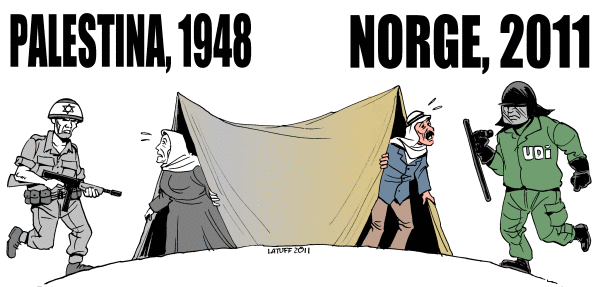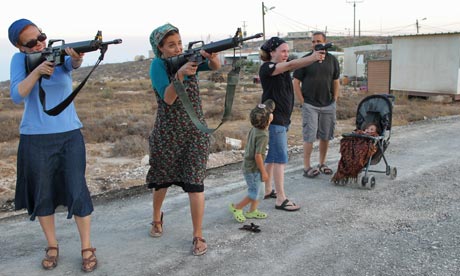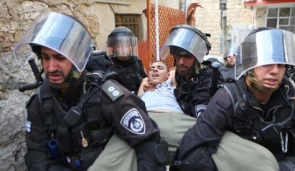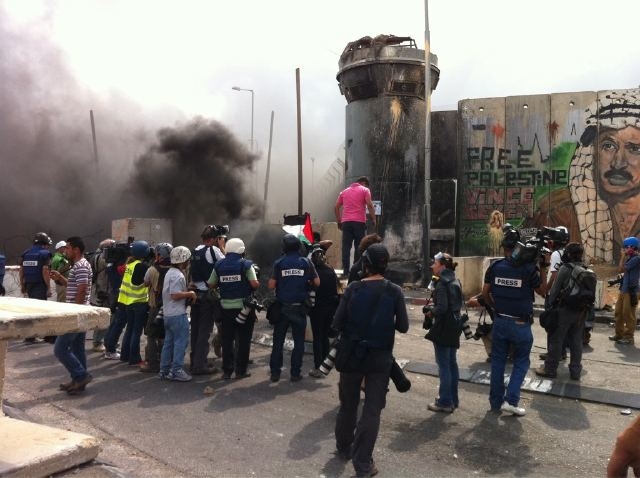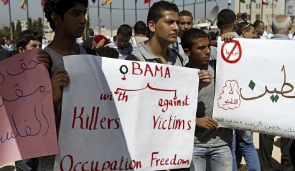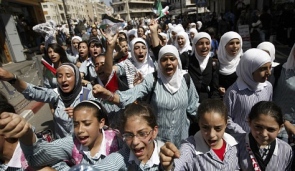EDITOR: US Congress vies with racist settlers to harm Palestinians
While the Israeli fascists are burning mosques, the US Congress is climbing allover itself with measures to harm Palestine. Cutting funding for essential services – that will help a lot; cutting funds for the UN for dealing with the Palestinian vote – that will really be useful. They are thinking up new schemes daily.
This must be the signs of the American decline and fall – financial, political, cultural and moral, all mixed up. For those of us who tried to persuade the Palestinians to avoid building on US positions, this is sad reminder of the folly of the Fatah positions, and their hopes based on US pressure. It was never real, and now m ore than ever such futile hopes are a travesty and and offence against the people of Palestine. The US has always been a devoted partner of Zionism, and to wait for it to become an ‘honest broker’ is to wait for a messiah which is not coming. The Palestinian leadership, such as it is, should learn to confront the US, rather than to whimper before it. Nothing good will come out of this servility.
Vandals attack mosque in northern Israeli village: Guardian
Arson attack on mosque in Arab village of Tuba-Zangaria believed to have been ‘price tag’ strike by Israeli settlers

Vandals have set fire to a mosque in an Arab village in northern Israel, provoking protests and clashes with police. Graffiti spraypainted on the walls of the building suggested Jewish radicals were involved.
About 200 residents of the village of Tuba-Zangaria, Arab citizens of Israel, marched to a major junction nearby with the intention of blocking roads in protest, Micky Rosenfeld, a police spokesman, said.
Some of the demonstrators set tyres on fire and threw stones at police officers, who dispersed the crowd using teargas, Rosenfeld said. No one was injured.
Police were mobilised to prevent further disturbances and were meeting village leaders in an attempt to defuse tensions, he added.
Rosenfeld said a carpet in the mosque was set on fire, damaging interior walls. Copies of the Qu’ran were burned, Israeli media reported.
Rosenfeld said the words “price tag” had been spraypainted on the building – a reference to a settler practice of attacking Palestinians and their property in retaliation for Palestinian attacks and government operations against settlements.
Several weeks ago, the government destroyed structures in an unauthorised Jewish settlement in the West Bank. The operation was immediately followed by an arson attack on a mosque.
Army Radio reported that the family name of a settler and his infant son who were killed in a car crash near the West Bank town of Hebron last week was also scrawled on a wall.
Israeli police said rocks were thrown at the man by Palestinians, hitting him around the head and causing him to lose control of the car.
Rosenfeld said security was heightened across northern Israel following the attack. Large numbers of Israeli Arabs live in northern Israel.
The Israeli prime minister, Binyamin Netanyahu, denounced the mosque attack and ordered the Shin Bet internal security agency to act quickly to locate the attackers. A message from his office said he was “fuming” when he saw the pictures, and said the attack “ran counter to the values of the state of Israel”.
US Congress blocks £128m in aid for Palestinians: Guardian
Palestinian Authority accuses Congress of holding back funds to punish Mahmoud Abbas’ bid for UN statehood
The Palestinian Authority has accused the US of “collective punishment”, after the US Congress blocked $200m (£128m) in aid in response to President Mahmoud Abbas’ bid for UN statehood.
The decision to freeze the payments was reportedly made by three congressional committees on 18 August, before Abbas’ planned bid for statehood recognition at the UN the following month.
The funds, intended for food aid, health care, and infrastructure projects, were supposed to have been transferred within the US financial year, which ends today. The Obama administration is reportedly negotiating with congressional leaders to unlock the aid.
“It is another kind of collective punishment which is going to harm the needs of the public without making any positive contribution,” Palestinian Authority spokesman Ghassan Khatib told the Independent.
“It is ironic to be punished for going to the United Nations.”
USAid has already started scaling back its aid operations in the West Bank and Gaza, and there are fears it may be forced to end all humanitarian work and distribution of financial support to the Palestinian Authority by January.
There are also fears the move could lead to a security crisis in the Palestinian territories.
“Security co-operation with the Palestinians is excellent at the moment and we do not want to jeopardise that,” a senior Israeli military official official told the Independent.
Democrat Gary Ackerman, member of the House sub-committee on the Middle East and South Asia, told a meeting of representatives and leaders of Jewish organisations outside the UN headquarters on Monday that “there may need to be a total cut-off of all aid to the Palestinians for pursuing this course of action which is very dangerous and ill advised.”
Former president Bill Clinton recently warned Congress to leave the issue of aid to the Obama administration. He said: “Everybody knows the US Congress is the most pro-Israel parliamentary body in the world. They don’t have to demonstrate that.”
A UN security council panel on admitting new members to the UN met to discuss the Palestinian bid for the first time on Friday. After the meeting, Lebanese UN ambassador Nawaf Salam said the committee unanimously agreed to hold further meetings next week.
Palestinian prisoners’ hunger strike continues – now is the time for international solidarity!: IOA
5 OCTOBER 2011
As Palestinian prisoners’ hunger strike enters its second week, international solidarity is needed now, more than ever. Prisoners are being sent to isolation in increasing numbers, family visits are being denied, families threatened and identity cards conficated, lawyer visits denied, and belongings and clothing confiscated.
International solidarity to support Palestinian hunger strikers is also growing:
éirígí, an Irish republican socialist political party, has called for a vigil at the Israeli embassy in Dublin on October 5 to support hunger strikers; the Campaign to Free Ahmad Sa’adat encourages all to attend!
The International Jewish Anti-Zionist Network has issued a strong call for solidarity with the Palestinian hunger strikers, and the striking prisoners in California, including a highlight of the case of Ahmad Sa’adat. We encourage all to sign on.
A number of international organizations, including the Platform in Solidarity with Palestine, the Irish Republican Socialist Committees, and others, have issued statements and calls in solidarity with the prisoners.
The website mobilizing solidarity with the California prison hunger strike – where prisoners have also been denied legal visits, lawyers threatened, and retaliation used against prisoners – has also provided information in solidarity with Palestinian prisoners. We urge people to follow the California strike and provide support and solidarity!
There is a new Campaign to Free Ahmad Sa’adat flyer for download and distribution – download the flyer here and distribute it in your community, at a protest at the Israeli embassy and at local events.
In Canada, Voice of Palestine Radio will feature an interview with a prisoner support activist live from Ramallah. The show will air at 8-9 PM Pacific Standard Time and can be heard on Vancouver Cooperative Radio (CFRO) 102.7 FM live at that time for people in Vancouver, Canada. People outside of Vancouver can listen to the show live on the Internet http://www.coopradio.org/content/listen.
Palestinian prisoners in several prisons, including Nafha prison, have reported in the past few days that they were threatened that family visits would be denied in retaliation for their participation in the hunger strike. Israeli prison officials told the prisoners that for each day they spent on hunger strike, they would be banned from family visitation for 1 month.
In addition, women prisoners participating in the hunger strike, Sumoud Kharajeh, Linan Abu Ghoulmeh, Duaa Jayyousi and Wuroud Kassem, were moved into isolation and solitary confinement, Linan Abu Ghoulmeh while under arbitrary administrative detention.
The Israeli occupation prison service also transfered prisoners from Departments 13 and 14 in the Nafha prison to other prisons; their location remains unknown. Two prisoners in Nafha, members of the Popular Front for the Liberation of Palestine who were abducted from Jericho prison with Ahmad Sa’adat have also been placed in isolation, Hamdi Qur’an and Basil al-Asmar.
During a family visit, Israeli occupation prison authorities confiscated the identity cards of the families of Palestinian prisoners Mahmoud Abu Wahdan and Raed Sayel. The families were told that because their imprisoned relatives refused to break their hunger strike, they were not allowed to visit them.
In the Ofer prison, Israeli authorities placed 9 detainees – members of the PFLP – in solitary confinement and confiscated all their personal effects, clothing and other belongings.
In Asqelan Prison, the Israeli prison administration prevented lawyers from visiting detainees. A lawyer who came to Asqelan to visit prisoners Ahed Abu Ghoulmeh, Allam Al-Kaabi, and Shadi Sharafa was banned from visiting the prisoners and informed that these three and all prisoners from the PFLP who are on hunger strike are prohibited from receiving lawyer visits.
The hunger strike has been growing as well. Earlier in the day 20 prisoners from the Fateh party joined the open hunger strike, including the oldest Palestinian prisoner, Fakhri Barghouti, who entered his 34th year in Israeli prisons, and Akram Mansour, who has been imprisoned for 33 years and is quite ill with cancer. Additional prisoners also plan to announce their joining the hunger strike in the next few days. In the Negev prison, Anas Al-Shanti was placed in solitary confinement. In Ramon prison, prisoner Basem Al-Khandaqjy, a member of Central Committee of the People’s Party, joined the hunger strike.
TAKE ACTION TO SUPPORT AHMAD SA’ADAT AND ALL PALESTINIAN PRISONERS!
1. Picket, protest or call the Israeli embassy or consulate in your location and demand the immediate freedom of Ahmad Sa’adat and all Palestinian political prisoners. Make it clear that you support the demands of Palestinian prisoners on hunger strike! Send us reports of your protests at Israeli embassies and consulates.
2. Distribute the free downloadable Campaign to Free Ahmad Sa’adat flyer in your community at local events.
3. Write to the International Committee of the Red Cross and other human rights organizations to exercise their responsibilities and act swiftly to demand that the Israelis ensure that Ahmad Sa’adat and all Palestinian prisoners are freed from punitive isolation. Email the ICRC, whose humanitarian mission includes monitoring the conditions of prisoners, at jerusalem.jer@icrc.org, and inform them about the urgent situation of Ahmad Sa’adat.
4. Email the Campaign to Free Ahmad Sa’adat at info@freeahmadsaadat.org with announcements, reports and information about your local events, activities and flyer distributions.
The Campaign to Free Ahmad Sa’adat
info@freeahmadsaadat.org
Twitter:http://twitter.com/freeahmadsaadat
On the world stage, Obama the idealist has taken fright: Guardian
Bin Laden’s killing aside, his foreign policy has all been waffle, dither and drift – with a trail of acts of dismaying expediency
Simon Tisdall
Candidates run on hope. Incumbents run on their record. But Barack Obama, lining up for a second term at the White House next year, has little to offer on either score. The heady optimism of 2008 has dissipated. At home, Obama is primarily associated with hard times: only 34% of voters approve of his handling of the economy, according to a recent poll. Abroad, his presidency has come to stand for impotence and incompetence. He promised new beginnings; what he has delivered, for the most part, is waffle, dither and drift.
If this verdict seems harsh, take a quick tour round the globe. Everywhere the pillars of American superpower are crumbling. The old habit of hegemony, formed in the postwar decades and confirmed in 1989 as Soviet power imploded, is fading as fast as a Honolulu sunset.
Part of the explanation is faltering industrial and financial clout, reflecting the rapid rise of rivals like China and India. But that is compounded by another central element: Obama’s persistent failure to stand up, in practical, substantive ways, for the values, beliefs and interests he so eloquently espouses.
Obama’s early, anguished indecision over keeping his promise to close Guantánamo Bay now looks like a grim portent. So, too, does his administration’s failure to support the Iranian students whose “green revolution” was so cruelly suppressed in Tehran in 2009. When the Arab spring took hold this year, the man who in Cairo had preached the pre-eminence of the democratic ideal took fright. Tunisia did not matter much. But when he faced accusations of becoming the president who “lost” Egypt, Obama’s dither default setting was triggered anew.
In the event he achieved the worst of all worlds. Hosni Mubarak, that staunch, unlovely friend of the west, was deposed with Washington’s belated blessing – to the lasting mortification of another key American ally, Saudi Arabia. Now the army-led, supposedly caretaker regime that replaced him appears equally unappealing. Egypt may soon require a second revolution, and next time the Islamists may not act so coy. For its part, Riyadh absorbed the lesson of US unreliability and took matters into its own hands by crushing dissent in Bahrain.
In Libya, as elsewhere, Obama talked the good fight from the sidelines. Speaking about Syria in August, he condemned President Bashar al-Assad’s “imprisoning, torturing and slaughtering” of pro-democracy demonstrators and demanded he step aside immediately. The call came after months of White House debate about the consequences of supporting change in Damascus. Assad, meanwhile, contemptuously ignores US mouthings, and a fracturing Syria accelerates towards the abyss.
Obama’s handling of his legacy wars – Afghanistan and Iraq – provides little to crow about on the stump. The Afghan troop surge has not brought about the looked-for breakthrough. Instead, casualties are up, while the Taliban, in contrast, have increasingly resorted to targeted terror tactics – such as last month’s assassination of Burhanuddin Rabbani, a former Afghan president and head of the high peace council.
Any examination of whether Obama and his diplomats and commanders want a negotiated Afghan peace settlement finds President Dither at his most infuriating. Speaking at the end of Ramadan, Mullah Muhammad Omar, the Taliban leader, clearly signalled interest in pursuing talks to create a new political order acceptable to all Afghans. But Washington seems more intent on threatening Pakistan than ensuring a peaceful transition in Afghanistan after 2014. Much the same may be said of Iraq, where US concerns focus less on the stability of a country it so massively destabilised than on how Iran may exploit the US withdrawal.
Obama’s foreign policy under-achievement leaves a global trail. He spoke out forcefully in Prague about the necessary inevitability of a nuclear bomb-free world. But his carrots and sticks have had little impact on North Korea’s or Iran’s ambitions, while the Libyan war delivered a clear message: if Muammar Gaddafi had not abandoned his nuclear weapons programme in 2003 he might still be in power now.
As a candidate Obama condemned Russia’s 2008 invasion of Georgian territory. But as president he offered Vladimir Putin’s regime a “reset” of relations amounting to a reward for bad behaviour. Along the Pacific rim, meanwhile, widely shared perceptions of a lack of political resolve in the face of China’s military expansionism are fuelling an arms race from Taiwan and Malaysia to Vietnam and Australia.
Amid multiple disappointments, one dismaying act of expediency stands out: Obama’s open-ended threat to veto UN recognition of a Palestinian state. After the three-year runaround handed out by Israel’s last-ditcher, “no surrender” prime minister, Binyamin Netanyahu, Obama had the chance to deliver a symbolic blow for peace, something surely right up his street. But with a wary eye on the 2012 campaign, he just couldn’t do it. Under Obama, the empire does not strike back. It strikes out.
If Obama is re-elected it won’t be due to his international achievements – unless you think killing Osama bin Laden is worth another four years.
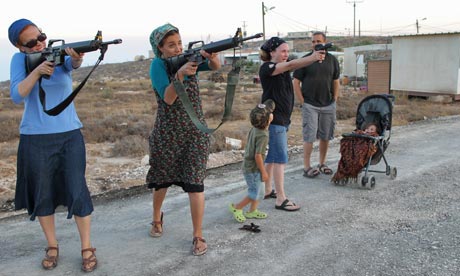
Israel must restart talks with its neighbours or face isolation, says US: Guardian
Defence secretary Leon Panetta says Israel needs to focus on diplomacy as well as security as he travels to Middle East
US defence secretary Leon Panetta says Israel needs to focus on diplomacy as well as security as he travels to Middle East Link to this video
The US has warned that Israel is becoming increasingly isolated in the Middle East, and said the country’s leaders must restart negotiations with the Palestinians and work to restore relations with Egypt and Turkey.
In a blunt assessment made by Leon Panetta, the US defence secretary, as he was travelling to Israel, he said the ongoing upheaval in the Middle East made it critical for the Israelis to find ways to communicate with other nations in the region in order to have stability.
“There’s not much question in my mind that they maintain that [military] edge,” Panetta told reporters travelling with him. “But the question you have to ask: is it enough to maintain a military edge if you’re isolating yourself in the diplomatic arena? Real security can only be achieved by both a strong diplomatic effort as well as a strong effort to project your military strength.”
Panetta is scheduled to meet Israeli and Palestinian leaders this week, and then travel to a meeting of Nato defence ministers in Brussels. His visit comes as negotiators push for a peace deal by the end of next year, increasing pressure for the resumption of long-stalled talks.
The Pentagon chief said Israel risks eroding its own security if it does not reach out to its neighbours. “It’s pretty clear that at this dramatic time in the Middle East, when there have been so many changes, that it is not a good situation for Israel to become increasingly isolated. And that’s what’s happening,” he said.
Panetta said the most important thing was for Israel and its neighbours “to try to develop better relationships so in the very least they can communicate with each other rather than taking these issues to the streets”.
His visit comes at a particularly critical and fragile time. The Palestinian president, Mahmoud Abbas, has asked the UN to recognise an independent Palestinian state in the West Bank, east Jerusalem and the Gaza Strip, areas captured by Israel in the 1967 six-day war. The US opposed the UN bid, saying there is no substitute for direct peace negotiations. But with Israel continuing to build settlements in the West Bank and east Jerusalem, Abbas says there is no point in talking.
About 500,000 Jewish settlers now live in the West Bank and east Jerusalem. Israel withdrew from Gaza in 2005.
The US, Britain, France and other UN security council members are likely to try to hold up consideration of the application while they press for a resumption of Israeli-Palestinian negotiations, diplomats said.
Negotiators for the Quartet (UN, US, EU and Russia), are asking the Israelis and the Palestinians to produce comprehensive proposals on territory and security within three months. Israeli officials have welcomed parts of the proposal, but have also expressed concerns about the timetable for some discussions. They also have refused to endorse the 1967 prewar borders as a basis for the future Palestinian state – something President Barack Obama has endorsed.
The Palestinians, meanwhile, have said they will not return to talks unless Israel freezes settlement building and accepts the pre-1967 war frontier as a baseline for talks. The Quartet is urging both sides to avoid “provocative actions”. Last week, Israel approved the construction of 1,100 new housing units in an area of Jerusalem built on land captured in 1967, a move that drew widespread international condemnation.
Panetta said he wanted to stress to both sides that instead of setting conditions or pursuing other approaches, “the most important thing they can do is go to the negotiating table. That would be a tremendous signal to the world that both the Israelis and the Palestinians want to try to find a solution to these problems. I don’t think they really lose anything by getting into negotiations.”
Panetta is scheduled to meet the Israeli defence minister, Ehud Barak, and the prime minister, Binyamin Netanyahu, as well as Abbas and the Palestinian prime minister, Salam Fayyad.
His visit to Israel comes six months after his predecessor, Robert Gates, travelled to the region to meet Israeli leaders and make a journey to the West Bank to talk to Fayyad.
The US has said it would veto the Palestinians’ UN request, despite the high political cost in the Arab world. However, Washington would not need to use its veto if the Palestinians fail to get the support of at least nine of 15 council members. Palestinian officials have said they believe they have eight yes votes, and are lobbying for more support.
Israel: Palestinian UNESCO bid is rejection of negotiations: Haaretz
Membership request in UN cultural agency seen as test case for support for Palestinian statehood; U.S. warns will cut funding to agency if bid successful.
Palestinians cleared their first hurdle Wednesday to full membership in the UN cultural agency, an official said, as they expand and accelerate their push for international recognition, despite opposition from the United States and Israel.
In response to the news, Israel’s Foreign Ministry said that the Palestinian request for membership to UNESCO is a “rejection of the path of negotiations, as well as of the Quartet plan to continue with the political process.”
What do you think of the Palestinian application for UNESCO membership? Visit Haaretz.com on Facebook and share your views.
“This move negates the efforts of the international community to advance the political process. A decision like this will not advance the Palestinians in their aspirations to statehood,” the ministry said.
Israel’s ambassador to UNESCO, Nimrod Barkan, told Haaretz the U.S. has clearly indicated that if the motion passes and the Palestinians become full members, it will stop paying its dues to the organization. This, in turn, will cripple UNESCO, as the U.S. pays 22 percent of the entire budget.
“The tragedy is that this hampers UNESCO from doing its real job,” he added to the Associated Press, noting that the agency’s board has taken up five Israel-related issues in recent days and none regarding Syria or Libya.” “A relatively small minority is hijacking the organization for other purposes,” he said.
With peace talks stalled and landmark efforts to get Palestine recognized at the United Nations inching along a labyrinthine path, Palestinian diplomats are pursuing other, potentially faster avenues toward getting the world to consider their territories a nation.
One is in Paris-based UNESCO, the UN Educational, Scientific and Cultural Organization, where the executive board agreed Wednesday to send the Palestinians’ request to a vote of the body’s members.
The Palestinians are also seeking a foothold in the World Trade Organization and won partnership status this week in the Council of Europe, the continent’s leading human rights body.
None of this will solve the conflicts with Israel over security, violence and borders that for decades have prevented a Palestinian state from coming into existence. But it may up the pressure at UN headquarters and weigh on fresh efforts to resuscitate peace talks.
The UNESCO request is being seen as a test case indicating the breadth of support for the Palestinian push.
The Palestinian delegation, which has had observer status at UNESCO since 1974, presented a draft resolution to the agency’s executive board on Wednesday, according to diplomats there.
A UNESCO official later confirmed that the board voted overwhelmingly to send it to a vote of the body’s 193 members, two-thirds of whom must approve any request for full membership.
The vote has not been scheduled, but will take place at UNESCO’s General Conference, which runs from Oct. 25 to Nov. 10. The diplomats and the official spoke on condition of anonymity because of the sensitivity of the issue.
The question is highly divisive, and may rekindle tensions between Arab and Western governments just as democratic uprisings in the Arab world have brought them closer together.
The Palestinians have sought UNESCO membership before, to no avail. This year, UNESCO diplomats said, they are using a different method for the request, via a draft resolution. They may have more momentum now, after Palestinian President Mahmoud Abbas took his people’s quest for independence to UN headquarters in a landmark move last month.
Israeli diplomats are trying to persuade leading governments “not to politicize UNESCO and leave this subject to New York,” Israel’s ambassador to UNESCO, Nimrod Barkan, told The Associated Press.
“The tragedy is that this hampers UNESCO from doing its real job,” he said, noting that the agency’s board has taken up five Israel-related issues in recent days and none regarding Syria or Libya. “A relatively small minority is hijacking the organization for other purposes,” he said.
Ismail Tilawi, the representative of UNESCO in the Palestinian territories, says that since the formation of the Palestinian Authority in the mid-1990s, a request for Palestinian membership has been on the agenda of every UNESCO General Conference, which convenes every two years.
The chairman of the foreign affairs committee in the U.S. House of Representatives, Ileana Ros-Lehtinen, called for a cutoff of U.S. funds to UNESCO if the Palestinian effort succeeds this time.
“Feeling that their efforts at the UN Security Council will fail, the Palestinian leadership is shopping around the UN system for recognition,” Ros-Lehtinen, a Florida Republican, said in a statement. “It is deeply disappointing to see UNESCO, which has reformed itself in
recent years, poised to support this dangerous Palestinian scheme. The U.S. must strongly oppose this move.”
In fact, a U.S. law prohibits Washington from funding a UN organization that grants full membership to any group “that does not have the internationally recognized attributes of statehood.”
Since the U.S. makes significant contributions to UNESCO, the membership bid, if successful, could result in a major drop-off in funding for the agency.
The U.S.¬ withdrew from UNESCO in 1984 to protest a resolution adopted years earlier that had equated Zionism with racism and did not rejoin for nearly 20 years.
France is worried the Palestinian bid at UNESCO will derail efforts to resuscitate peace talks.
UNESCO is “not the appropriate place” and its meeting later this month “is not the right moment” to seek recognition, a French diplomat said. The diplomat was not authorized to be named speaking about closed-door UNESCO discussions.
The UNESCO meeting in Paris comes amid a new effort by the so-called Quartet of Mideast negotiators to revive peace talks. The Obama administration’s special Mideast peace envoy, David Hale, is coming to Paris this week ahead of a meeting in Brussels of the Quartet – the U.S., European Union, Russia and UN.
In addition to advancing the Palestinians’ push for recognition, UNESCO membership could offer the Palestinians a key bargaining chip by allowing them to seek protected U.N. status for disputed cultural heritage sites.
At UN headquarters in New York, the Security Council committee that reviews membership applications is considering the Palestinians’ request. The committee is seeking to determine if the request meets the criteria of the UN.
In response to the news, Israel’s Foreign Ministry said that the Palestinian request for membership to UNESCO is a “rejection of the path of negotiations, as well as of the Quartet plan to continue with the political process.”
“This move negates the efforts of the international community to advance the political process. A decision like this will not advance the Palestinians in their aspirations to statehood,” the ministry said.
A Palestinian political prisoner’s take on Israel’s protest movement: The Electronic Intifada
Ameer Makhoul Gilboa Prison 5 October 2011
The recent wave of protests in Israel, which pretend to call for social justice, is one of the most powerful and massive mobilization to ever happen in the country. An unprecedented character of this movement, one should add, is its pretension to create an open space for groups, as well as individuals.
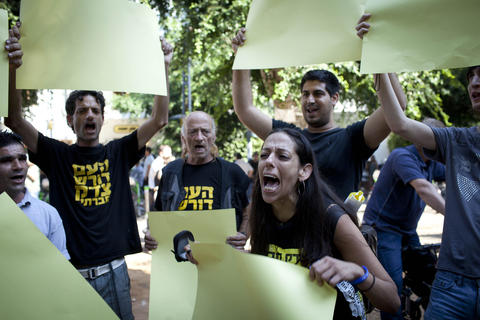
The dynamics that guard these protests are that of a social movement. However, the content of the demonstrators’ demands should be subjected to a serious discussion and critique. One of the major contradictory aspects of this movement is the exclusive understanding of the value of social justice. Social justice is a universal value, but for the protesters in Tel Aviv’s Rothschild Boulevard, it is limited only to the internal dynamics of Israeli society.
On Rothschild Blvd., the root cause of the social injustices Israelis face are a taboo — that is, the occupation, colonial racism, militarization of all life’s aspects and the prevailing, aggressive neoliberal thought and system. These issues are deeply related to the Israeli state-building process.
The Israeli social protests should be seen in light of two major border-crossing developments: the Arab peoples’ uprisings, an example of how when the people move, nothing is impossible; and second, the growth of the international and globalized social movement. The latter, day by day, is gaining a popular character that is challenging the world’s neoliberal elites in what we know as the “wealthy” nations and their current crisis, impacting the entire world.
The recent protests are indicative of the growing strength of the Israeli social movement.
Furthermore, it partially challenges the current system of power division, attempting to redefine it on new principles in order to meet the agenda of the Israeli middle class, out of which the movement was initiated and is now led by. But Israel’s poorest classes are excluded by the leadership of this movement and its discourse.
Israel’s middle class losing power
Israel’s strong middle class, on the other hand, mobilized by the sense of losing its power — an outcome of the neoliberal hegemony in Israel that is represented not only by Prime Minister Netanyahu, but also the new elites in the country and their reproduction of the state’s new ideology. Neoliberalism became the joint ideology of those in power of the executive authorities and capital of the state.
During the recent years, Israeli society became more aware of the growing socioeconomic gaps. In the meantime, the Israeli state has witnessed the recreation of the tycoons. Very limited in number and running a small number of economic enterprises and businesses according to explicit and implicit cartel agreements, the new Israeli tycoons become the true rulers of the economy and the allocation of public funds.
On the level of government, on the other hand, the tycoons’ neoliberal thought shapes the decision-making process through the implementation of privatization policies that also include natural resources, such as Dead Sea minerals and the recently discovered gas and oil reserves on the eastern shores of the Mediterranean. These natural resources were granted to the tycoons by Netanyahu’s government, arguing that the former is the true engine of economic growth. The Israeli middle class, however, argues the opposite: the middle class is the base for economic flourish; the resources are to serve, in addition to the state’s income, the community as a whole.
Additionally, the acceptance of Israel to the Organization for Economic Co-operation and Development (OECD) in May 2010 had a contradictory result of contributing to the social protests. Israelis became more aware of the existing gaps of income in the state.
Israel’s “miracle” economy in question
As often happens, the neoliberal policy legalizes corruption in a structural manner within the state. The transfer of natural and public resources to the tycoons is smoothly carried out by new regulations and new laws, and the judicial branch is complicit with the interests of the tycoons. Meanwhile, Netanyahu’s government is proud to tell the world about the “miracle” of the Israeli economy, which overcame the worldwide financial crises.
On the ground, and as a direct consequence of the magic Netanyahu speaks of, the number of people in Israel who live in poverty is growing. While according to Netanyahu’s magical statistics unemployment is being reduced, but the number of people who work with lack of dignity is growing. The current social protests, therefore, came to raise the question of who is paying the price for Israel’s apparent economic flourish. Hence it is the middle class, not Israel’s poorer classes, that is the core of this movement. Furthermore, the middle class’ voice is easily raised high by the media, for it is where most of the Israeli elite come from.
The question is, can such a movement provide equal opportunity for everyone to enter its space and to take part in it? The answer is simply no, because freedom of expression does not simply mean the equal opportunity to impact and exert influence.
Even though this movement is forming a new social force by challenging the sacred cows of the Israeli ruling establishment, such as “Israeli security,” it is also questioning the traditional opposition and the aged trade union, the Histadrut. Such a questioning of the entire ruling elites can only happen when the people are sharing a feeling that they can make change.
An apolitical protest?
However, the contradictory nature of “social justice,” as this universal value is understood on Tel Aviv’s Rothschild Blvd., silences all issues of injustice related to the Palestinian people. I am not just speaking of Palestinians in the West Bank, the Gaza Strip and in exile, but also those who are Israeli citizens, who suffer daily from land confiscation, racist legislation, the non-recognition of their villages by the state and the Judaization of the Naqab (Negev) and the Galilee.
According to this movement’s discourse, these issues are “political,” not “social,” and are therefore not included in the movement’s understanding of social justice. By considering themselves apolitical, the protesters ignore the occupation, the blockade on Gaza and state’s racist system against Palestinian citizens. (Or the protesters consider racism only in cases of Jewish Ethiopians and East Asian foreign workers, but even then solely on an individual basis.)
According to Israeli terminology, being apolitical allows the inclusiveness of groups from colonial settlements in the West Bank, Jerusalem and the Golan, which are being invited to take part of in the protests. This creates an ethical contradiction, and of course a political one. The values of the Israeli social movement, in other words, are only limited to Israelis.
Palestinians, on the other hand, are excluded from any justice. According to the Israeli social movement, the 7,000 Palestinian political prisoners do not deserve social justice. Furthermore, neither do Palestinian refugees and the internally displaced. Israel’s wall in the West Bank and the Gaza blockade are also not worthy issues to be dealt with by a movement that pretends to provide an open space.
Colonizing settlers are welcome, not the Palestinian families that are victims of the wall erected by the Israeli law; not the solidarity movements for a just peace; not the peoples around the words who are victims of the bloody regimes with close military and intelligence cooperation with the State of Israel.
Envisioning a more kind system of injustice
The Israeli social movements, abiding to the Israeli national consensus, ignore the rights of the “other” for social justice. By not dealing with the root causes of the unjust system in Israel, the Israeli social movement wishes to make things less unjust rather than to change the system and the regime.
By not dealing with the colonial, racist Zionist ideology and the nature of the Israeli state, some are choosing to consider the Israeli social movement as “post-Zionist.” However, as we know very well, post-Zionism means neither anti-Zionism nor the de-Zionization of Israel. But I still believe that this movement can lead to changes in the direction of re-establishing the welfare capitalist state that existed in Israel. Such a state can meet the interests of a wider majority of Israeli citizens, including those of Palestinian citizens of Israel. However, the Israeli social movement cannot bring historical justice to the Palestinians in Israel. While some Palestinian organizations are participating in the social mobilization, they are fully aware that its demands do not wholly cover the Palestinians’ social and political agenda.
Of the Palestinians groups that are participating in the social protests are the Palestinian Bedouins of al-Araqib, a village in the Naqab that is unrecognized by the Israeli state and has been demolished 28 times by government bulldozers. However, despite their participation, the injustices caused by the state to the Bedouins were not included in the social protests’ leadership’s list of demands.
While the social movement’s discourse is not racist, it does not raise issues of racism. Justice does not only concern those who speak for it, but also others. A social movement is not a structural body; on the contrary, it is made of values, norms and the belief in equality for all. On this question, the Israeli social movement does not pass the exam.
By way of conclusion, I ask you to be aware that I am still behind the bars of Israeli prison. I can only learn about the recent developments through television, radio or the newspapers allowed in. However, I speak from the position as an activist, though it is difficult to get a feel of what goes on on the ground. I am one of 7,000 political prisoners who believe that injustice will fail, while liberation, freedom and human dignity will be fulfilled.
Ameer Makhoul is a Palestinian civil society leader and political prisoner at Gilboa Prison.
While the diplomats haggle, deadly tensions are mounting in the nascent Palestine: Guardian
25 SEPTEMBER 2011
By Harriet Sherwood
The quest for Palestinian statehood at the UN has worsened a climate of fear on the ground in the West Bank
The settlers come down the hill from the outpost, mostly on foot, but occasionally on horseback or in tractors or 4x4s. They carry Israeli flags, and sometimes bring guns, shovels and dogs. There may be as few as three or as many as 40. They taunt the local villagers and sometimes attack them. Often the Israeli army arrives and trains its weapons on the villagers.
In Qusra, deep among the terraced hills of the West Bank, fear is on the rise. “The settlers are provoking us continuously,” said Hani Abu Reidi, head of the village council. “They uproot olive trees, kill our sheep, burn our mosques and curse our prophet. They want to drag us into the sphere of violence. We do not want to go there.”
As the Palestinian quest for statehood looks set to be mired in diplomatic back rooms for weeks or months, tension on the ground is mounting. Both Palestinian villagers and Jewish settlers say each other is responsible for a spike in attacks over the past fortnight; mostly small-scale incidents such as throwing stones, molotov cocktails and insults. Both sides claim the other is preparing to invade their communities and attack their people. It has created an edgy climate of fear and menace, and is a forewarning of potential battles to come if the struggle for the land moves up a gear with impending Palestinian statehood.
The request by the Palestinians to be admitted to the United Nations as a full member state, formally submitted on Friday, will now be considered by the security council for an undefined period, during which efforts to get both sides back to the negotiating table will intensify.
If no progress is made, the Palestinians will press for a vote at the security council, a move the US has pledged to veto. The Palestinians would then have the option of asking the 193-member general assembly for enhanced status, albeit short of full statehood. As this process inches forward, anger on the ground is rising.
On Friday, violence between settlers from the outpost of Esh Kodesh and around 300 Qusra villagers ended in a haze of teargas and bullets fired at the villagers by Israeli troops, two of which struck Issam Odeh, 33, killing the father-of-eight.
Qusra set up a defence committee earlier this month after one of the village’s four mosques was vandalised in a settler attack condemned by the US and the European Union. Up to 20 unarmed men patrol the mosques from 8pm to 6am every night, and Abu Reidi claims they have already foiled at least one attack. Other Palestinian villages have followed suit.
On the hilltops, preparations for clashes have also been under way for weeks. Security around settlements and outposts has been reinforced with extra barbed wire, CCTV cameras, security guards and dogs. And the settlers themselves are armed and primed in anticipation of what they believe will be incursions by Palestinians intent on making their hoped-for state a reality on the ground.
This week, photographs were published on a pro-settler news website, Arutz Sheva, showing women from Pnei Kedem, an outpost south of Bethlehem, learning to shoot. In Shimon Hatzadik, a Jewish enclave in the midst of the Palestinian neighbourhood of Sheikh Jarrah, in east Jerusalem, settlers are preparing to invoke a law allowing self-defence against intruders. “We are talking about shooting at their legs and if that doesn’t work, and our lives are in danger, we won’t be afraid to shoot straight at them. Most of the residents here are armed,” spokesman Yehonatan Yosef told parliamentarians two weeks ago.
Activists in the settlement of Qiryat Arba, on the edge of Hebron, have distributed clubs, helmets and teargas to nearby outposts. “They’ve been given all of the tools we could provide for them in order to protect themselves,” Bentzi Gopstein, a member of Qiryat Arba’s council, told the Ynet news website. “But we must remember that the best defence is offence. We can’t stay close to our fences. If the Arabs can come to us, they must learn we can come to them.”
The settlers believe Israeli soldiers will be hampered by restraints imposed by commanders fearful of negative publicity. “They are not receiving the right orders,” said radical activist Itamar Ben-Gvir from Qiryat Arba. “There’s no state in the world that would allow the enemy to cross its lines and enter its communities. If the IDF will not act properly, we will have to defend ourselves.”
Women and children would take part in defensive action, he said. “We want to present an equation: women against women; children against children. The Arabs are intending to use their children and we will not sit still.”
Shaul Goldstein, mayor of the Gush Etzion settlement bloc south of Bethlehem, expects the focus in the coming weeks to “move from hypothetical issues in New York to practical terror here in Judaea and Samaria [the biblical term for the West Bank]“. Gush Etzion had a comparatively good relationship with its Palestinian neighbours, he said. “We are trying to talk to them to reduce friction and tension. But if the Palestinians march towards the settlements, there is a red line. If they try to cross, to penetrate our communities, it will be a big problem.”
As well as fighting on the ground, many settlers believe they must also wage a political battle against the Israeli government. “Netanyahu is a weak leader, not standing for the values he was elected for,” said Goldstein. “The [settlement] construction freeze was the first in history – and this from a rightwinger. So we have to push him, to press him, to keep him to hold the line.”
The settlers are not just fighting to hold on to the land they already occupy; they intend to expand and grow – as they see it, reclaiming the land that has been willed to them by God.
“Our purpose is to build new towns and communities, new outposts in Judaea and Samaria,” said veteran activist Daniella Weiss. “It’s our role as Jews to build the land of the Jews.”
In Qusra, Abu Reidi agreed the land is at the heart of confrontations between Jewish settlers and Palestinian villagers. “Their ultimate goal is to drive us from our land,” he said. “Defending the land is a holy task. If we let them succeed, they will take more and more.”
Turkey PM: Israel a nuclear threat to Middle East: Haaretz
Erdogan’s comment, another sign of deteriorating Israel-Turkey ties, comes during trip to South Africa.
Turkish Prime Minister Recep Tayyip Erdogan said on Wednesday that Israel is a threat to the Middle East region for having a nuclear weapon.
Erdogan spoke during a trip to South Africa. His comments were carried by Turkey’s Anatolia news agency.
Israel refuses to confirm whether it has a nuclear weapon, following a policy it terms “nuclear ambiguity,” but it is widely considered to be the Middle East’s only nuclear power.
Israeli-Turkish ties have deteriorated over Israel’s refusal to apologize for the deaths of nine Turkish activists in a raid on a Gaza-bound aid ship last year, prompting Turkey to downgrade relations.
Israel says its troops acted in self-defense.
Erdogan recently told TIME magazine that sanctions imposed by the United Nations on Israel would have resolved the issue of Mideast peace long ago, adding that he felt the Quartet on the Middle East was not genuinely seeking to resolve the conflict between Israel and the Palestinians.
